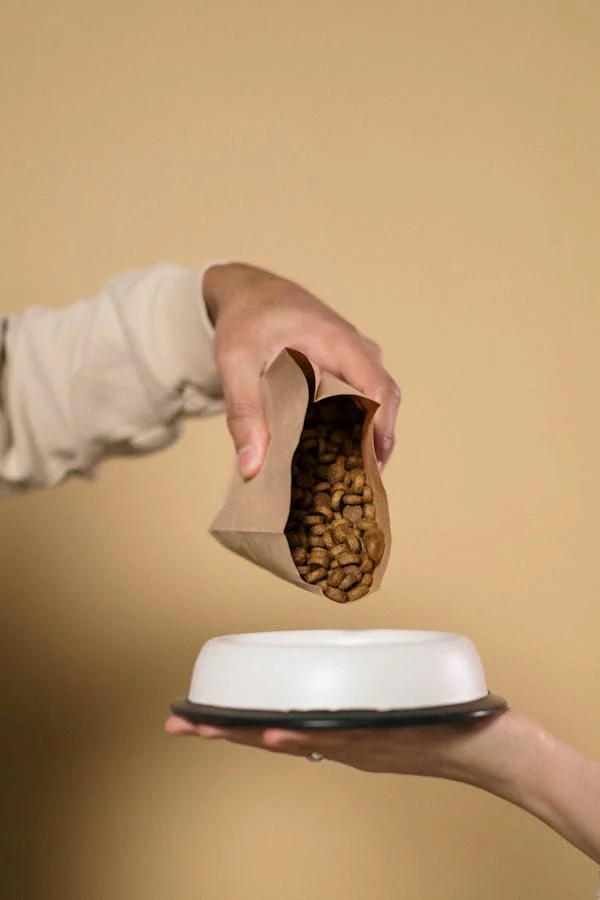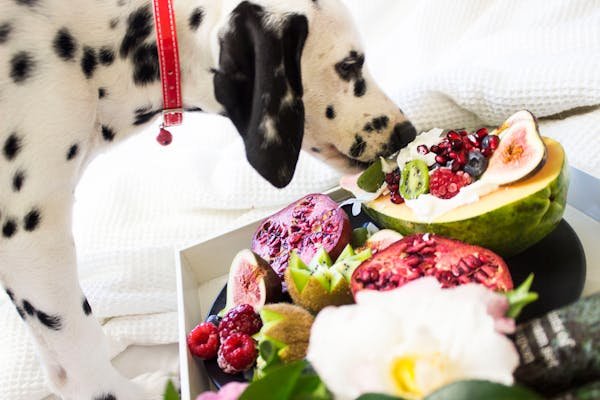Nourishing your dog with a variety of healthy foods goes beyond just preventing hair loss. These five options, along with a high-quality dog food, provide a well-rounded approach to promoting your dog’s overall health and a shiny, beautiful coat. Remember, a veterinarian’s guidance is always helpful when making dietary changes for your furry friend.
1. High-Quality Dog Food with Omega-3 Fatty Acids

- General features and specifications:
- Contains high-quality protein sources (chicken, fish)
- Rich in omega-3 fatty acids (salmon oil, flaxseed)
- May also include beneficial ingredients like zinc, vitamin A, and probiotics
- Performance and efficiency:
- Promotes healthy skin and coat
- May reduce excessive shedding
- Supports overall dog health
- Usability and design:
- Comes in various kibble sizes for different breeds
- May require gradual transition from current food
- Value for money:
- Generally more expensive than lower quality food
- Worthwhile investment for dog’s health
- Specific use cases:
- Ideal for dogs with dry, itchy skin or excessive shedding
- Beneficial for promoting a healthy coat in all dogs
- Frequently Asked Questions:
- Q: How long will it take to see results?
- A: It can take several weeks for your dog’s coat to improve.
- Q: Can I add omega-3 supplements?
- A: Consult your veterinarian before adding any supplements.
- Q: How long will it take to see results?
2. Salmon

- General features and specifications:
- Excellent source of omega-3 fatty acids and protein
- Can be cooked (baked, poached) or fed raw (consult vet first)
- Performance and efficiency:
- Promotes healthy skin and coat
- May reduce inflammation and allergies
- Usability and design:
- Easy to incorporate into homemade dog food or as a treat
- Value for money:
- Can be more expensive than some other proteins
- Offer in moderation as part of a balanced diet
- Specific use cases:
- Ideal for dogs with skin allergies or sensitivities
- Beneficial for all dogs for overall health and coat
3. Eggs

- General features and specifications:
- Affordable source of protein, healthy fats, and vitamins
- Can be cooked (boiled, scrambled) or fed raw (consult vet first)
- Performance and efficiency:
- Promotes healthy skin and coat
- Rich in biotin, which can support hair health
- Usability and design:
- Easy to add to homemade dog food or as a treat
- Value for money:
- Affordable protein option
- Specific use cases:
- Beneficial for all dogs for overall health and coat
- Frequently Asked Questions:
- Q: Can dogs eat raw eggs?
- A: Raw eggs can carry a risk of salmonella, so consult your veterinarian before feeding them raw.
- Q: Can dogs eat raw eggs?
4. Vegetables

- General features and specifications:
- Provide essential vitamins, minerals, and fiber
- Examples include green beans, carrots, sweet potatoes (cooked)
- Performance and efficiency:
- Supports digestion and nutrient absorption
- May contribute to a healthy skin and coat
- Usability and design:
- Can be steamed, boiled, or roasted and mashed into dog food
- Value for money:
- Cost-effective way to add nutrients
- Specific use cases:
- Beneficial for all dogs for overall health and digestion
- May help with weight management
5. Fruits

- General features and specifications:
- Provide natural sugars, vitamins, and fiber
- Examples include blueberries, apples (without seeds), bananas (in moderation)
- Performance and efficiency:
- Offer antioxidants and vitamins for overall health
- May contribute to a shiny coat
- Usability and design:
- Can be fed in small amounts as a treat
- Value for money:
- Affordable way to add variety and nutrients
- Specific use cases:
- Beneficial for all dogs for overall health
- Offer in moderation due to natural sugars
Remember: While these foods can be beneficial, consult your veterinarian before making significant changes to your dog’s diet, especially if they have any underlying health conditions. It’s important to maintain a balanced diet for optimal dog health.
